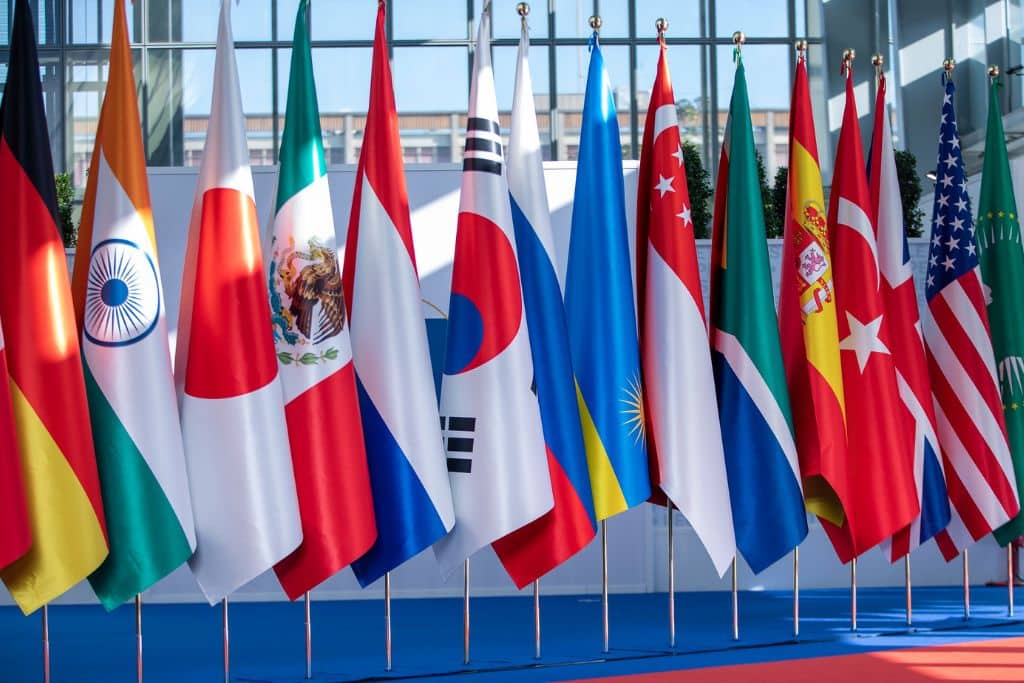The leaders of the world’s largest economies convened in Rio de Janeiro for a two-day summit. Together, these nations account for more than 80% of global emissions.
—
G20 leaders agreed to step up multilateralism and increase climate finance “from billions to trillions” during a meeting in Brazil but fell short of explicitly addressing planet-warming fossil fuels.
The leaders of the world’s largest economies met at Rio de Janeiro’s Modern Art Museum while the year’s most important climate summit, COP29, is underway in Baku, Azerbaijan. The two-day meeting tackled an agenda ranging from ongoing conflicts to climate change, poverty reduction and tax policy.
Issued Tuesday, the final G20 declaration said countries “welcome and fully subscribe to the ambitious and balanced outcome of the UN Climate Change Conference in Dubai (COP28), in particular the UAE Consensus,” without explicitly addressing the pledge made at the UN climate summit last year to “transition away” from fossil fuels.
They pledged a “strong commitment to multilateralism,” particularly with regards to the progress made on the Paris Agreement, which US President-elect Donald Trump has pledged to leave again.
You might also like: ‘Deeply Troubling’: Climate Experts Weigh in on Trump Election Victory
G20 nations account are largely responsible for global warming, accounting for some 85% of the world economy and more than three-quarters of climate-warming emissions.
The burning of coal, natural gas, and oil for electricity and heat is the single-largest source of global greenhouse gas emissions. These are the primary drivers of global warming as they trap heat in the atmosphere and raising Earth’s surface temperature.
In 2022, G20 governments provided $1.1 trillion in fossil fuel subsidies, by far the highest volume for at least a decade, mostly in a bid to protect consumers against the 2022 energy price crisis brought about by Russia’s invasion of Ukraine. Early estimates for 2023 suggest G20 provided $945 billion in support for coal, gas, oil and fossil power – a 19% year-on-year fall but still “well above” historical levels, according to BloombergNEF.
The International Energy Agency (IEA) has urged countries to halt new gas and oil field projects, arguing that this is the only way to keep the 1.5C-compatible net-zero emissions scenario alive.

Addressing the leaders in Rio on Tuesday, UN Secretary-General Antonio Guterres said new emissions reduction targets announced last week in Baku by Brazil and the UK – two G20 nations – “got us off to a good start.” But, he added, “all countries must do more.”
“Every country’s new plans must align with 1.5-degrees – with unambiguous, absolute emissions reduction targets for 2030 and 2035. Cover the whole economy, all sectors, and all greenhouse gases. Contribute to global goals agreed at COP28 to triple renewables capacity, double energy efficiency, and halt deforestation – all by 2030. And align fossil fuel production and consumption plans with 1.5-degrees,” Guterres said.
The critical 1.5C threshold was established at the 2015 COP21 climate summit, when 196 parties signed the legally binding Paris Agreement. They agreed to keep limiting global warming to below 1.5C or “well below 2C” above pre-industrial levels by the end of the century. Beyond this limit, experts warn that critical tipping points will be breached, leading to devastating and potentially irreversible consequences for several vital Earth systems that sustain a hospitable planet.
In the agreement, G20 leaders said they “support the implementation” of stocktake targets of tripling renewables and doubling the rate of energy efficiency improvements by 2030.
The failure to include direct reference to fossil fuels upset many lead negotiators at COP29, the Financial Times reported. The two-week UN climate summit, which is taking place in petrostate Azerbaijan, is set to conclude on Friday.
“[COP29] is a fragile enough process as it is,” one G7 negotiator was reported as saying in Baku on Tuesday, adding that the lack of an explicit statement by the G20 meant “the gradient of the climb we have this week just got steeper.”
Finance
The G20 sent a positive signal on climate finance, a centerpiece of the ongoing COP29 negotiations.
“We look forward to a successful New Collective Quantified Goal (NCQG) outcome in Baku,” the final agreement said, reiterating language on the need for “trillions” of dollars.
The latest Stern-Songwe report warns that by 2035, developing countries, excluding China, would need $1.3 trillion per year in climate finance. This will require an increase in private sector investment – which high-integrity carbon credits can help generate.

G20 leaders also said they support the COP29 Presidency and “commit to successful negotiations in Baku.” This, UN climate chief Simon Stiell noted, sends “a clear a clear message to their negotiators at COP29: do not leave Baku without a successful new finance goal.”
Stiell last week said G20 leaders must agree to provide the finance that the world’s poorest need to tackle the climate crisis or face “economic carnage.”
Disinformation
Also on Tuesday, the Brazilian government, in partnership with UNESCO and the UN, launched a joint effort to strengthen research and measures to address disinformation seeking to delay and derail climate action.
The Global Initiative for Information Integrity on Climate Change is a dedicated multilateral collaboration among sates and international organizations to fund research and action promoting information integrity on climate issues “in preparation for COP30 in Brazil,” said President Lula.
The initiative comes as Trump’s re-election in the US sparked fears that the country will backtrack on much of the Biden administration’s progress on climate.
Over the weekend, Trump announced several controversial cabinet picks, which include climate deniers, fossil fuel advocates and people with no political experience.
Featured image: Paul Kagame/Flickr.
This story is funded by readers like you
Our non-profit newsroom provides climate coverage free of charge and advertising. Your one-off or monthly donations play a crucial role in supporting our operations, expanding our reach, and maintaining our editorial independence.
About EO | Mission Statement | Impact & Reach | Write for us














